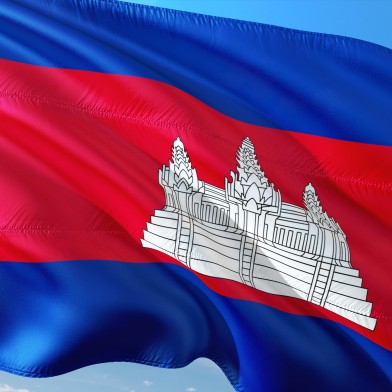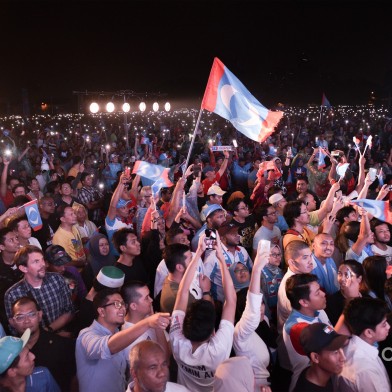Legendary Pakistani cricketer Imran Khan becomes the new prime minister of a country wracked with internal fissures and a floundering economy. Will he be the change Pakistan needs?
OPINION: Under the watchful eye of more than 371,000 deployed military personnel, Pakistan went to the polls on Wednesday, July 25, in what has largely been labelled an election of results foretold. Winning by a sizeable majority is former cricketing star-turned-politician Imran Khan.
To the world, he may be a legendary sportsman, playboy and Oxford graduate-turned-philanthropist (his cancer-care hospital initiative has made treatment widely accessible to the masses), but to a large number of Pakistanis who have weathered many a political coup, vulgar corruption and choke-holds on religious freedom, Imran Khan is just more of the same.
He is popularly being called the army’s new blue-eyed boy, an army – known as “the establishment” – that has long been seen as pulling the strings of the country’s economic, political and foreign decision-making. It was noticeable that army personnel were given magisterial powers at some of the key polling stations, and the use of mobile phones and cameras was disallowed by troops on guard. Perceptive observers were quick to point out the impediment this created for ordinary civilians in documenting irregularities and posting them on social media – one of the last platforms many ordinary Pakistanis have left to freely speak out and demand accountability.
While there have been other mainstream political parties, this election has been seen as a contest between Khan’s Tehreek-e-Insaaf (PTI), and dynastic heavyweights, the ruling Pakistan Muslim League-Nawaz (PML-N), and the Pakistan People’s Party (PPP).
The leaders of the incumbent PML-N, disgraced former prime minister Nawaz Sharif and his daughter Maryam Nawaz, are currently serving 10- and eight-year jail terms for failing to declare how they purchased luxury properties in the United Kingdom.
Sharif too was once a protégé of the same army (then under the military dictatorship of late President Ziaul Haq) that has allegedly facilitated his imprisonment, putting him in his place for trying to cautiously place civilian rule ahead of the all-powerful military. Many see this as a clearing for the next apprentice, with Khan carrying many of the telltale signs of the marionette at the behest of its puppet master.

Critics call him “Taliban Khan” for his draconian views on women’s rights, and his failure to condemn the country’s blasphemy law and persecution of religious minorities. These actions that have largely served to appease the sizeable vote bank of the religious right. For instance, Khan has loudly opposed amendments to the Hudood Ordinance, in which female rape victims must produce four male witnesses to the crime or face charges of adultery, a punishable offence.
Khan’s campaign slogans have been about bringing looters and plunderers to justice, but his own party consists of some of the most double-dealing former members of the opposition parties.
With that said, it is Khan’s party that breaks from dynastic politics. Both the Sharif-led PML-N and the Bhutto-led PPP have effectively been ruling and bankrupting the country for the last four decades, with now their children in line to carry forward their profiteering legacies. For the millions of Pakistanis who turned out in droves to vote, Khan’s slogan of "Naya (new) Pakistan" is seen as a shift from the inherited order. Imran Khan is the choice of those bereft of choice.
But his victory speech has been inspiring, a clarion call for change. He has pledged to make the country Jinnah’s Pakistan, true to the progressive vision of its founder. He has promised to decrease government expenditure and spend money on much-needed development. His heart seems to be in the right place, but it will take monumental effort for him to dispel the belief that the army has his back.
One of the first hurdles for the new prime minister to overcome will be a tanked economy in which the currency is in a tailspin. Foreign exchange reserves are depleting and the country looks set for another costly IMF bailout. Allegations of election-rigging by the six major political parties are rife, which could put them in protest mode or bring them together to form a dogged opposition in parliament. Results are still pouring in and it is not yet clear whether Khan will win by a simple majority or have to form a coalition government with the PML-N in Punjab and the PPP in Sindh, both provinces home bases of these dynastic parties. What is known is that he does not work very well with others.
Relations with the United States and India are fraught, the Pakistani Taliban continue to coordinate attacks in the country from Afghanistan, and the Islamic State has laid base in Pakistan to carry out a spate of fresh attacks. A suicide attack in the restive province of Balochistan on July 13 killed 149 people at a pre-election rally.
This is Khan’s chance to emerge on the right side of the fragile civil-military balance but the question remains: will he be allowed to take it?
Auckland-based Reem Wasay is a journalist and former op-ed editor of Pakistani newspaper Daily Times. She has also worked as a programme coordinator in the non-profit sector in New Zealand.
– Asia Media Centre


